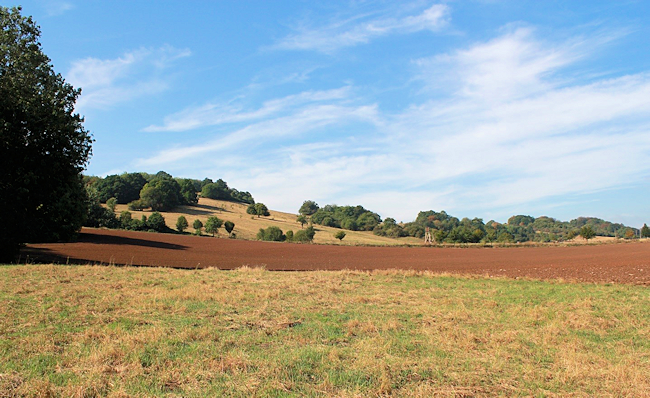Project
European joint program for sustainable soil management
![[Translate to English:]](/media/_processed_/3/b/csm_EJP_Soil_ST_1305_A_1_1350px_7ac1ab09b5.png)
EJP SOIL - Towards climate-smart sustainable management of agricultural soils
The EJP SOIL objectives are to develop knowledge, tools and an integrated research community to foster climate-smart sustainable soil management. Due to an European network of partners synergies can be used to advance knowledge and knowledge transfer.
Background and Objective
The overall goal of the EJP SOIL is to build a sustainable European integrated research system on agricultural soils and develop and deploy a reference framework on climate-smart sustainable agricultural soil management. This will create the enabling environment that will maximise the contribution of agricultural soil to key societal challenges such as food and water security, sustainable agricultural production, climate change
adaptation and mitigation; ecosystem services delivery, biodiversity preservation and human health.
Approach
The European Joint Programme SOIL will include joint programming and execution of research and other joint
integrative activities such as education and training (e.g. short-term missions, workshops), knowledge management, access to experimental facilities and databases, including also harmonisation, standardisation of soil data. The Thünen Institute plays the central role for Germany as a member of EJP soil and is working on various sub-projects within EJP SOIL.
Sub-project CarboSeq:
Carbon sequestration in soils is a natural process that must be actively promoted in order to reduce the effects of climate change on soil quality and thus enabling a more climate-friendly and sustainable soil management. To promote this process in a targeted manner, a comprehensive assessment of the additional quantity of organic carbon that can be stored in the soil with the help of agrcultural management options. This information is currently lacking for European soils and therefore the aim of CarboSeq is to estimate a realizable additional carbon storage potential across Europe, taking into account technical and economic restrictions.
More on this topic here.
Sub-project MaxRoot-C:
To combat climate change it is indispensable to reduce CO2 emissions from the agricultural sector and to bind carbon in the soil compensating for those emissions. This requires a transformation towards cropping systems which are equally profitable but sequester more carbon as the current systems. The most viable yet neglected option is through increased and deeper roots of main and cover crops. The project MaxRoot-C will pioneer assessment methods closing the existing knowledge gaps by providing robust data on root C inputs of main crop varieties and different cover crops across Europe, to determine if and how genotype selection is a useful tool to increase long-term soil carbon stocks and quantify the C sequestering potential therein. It will provide policy relevant data contributing to the development of future carbon sequestration methods of agricultural soils by improved variety selection on which to base future common agricultural policy.
More on this topic here.
Sub-project SIMPLE:
Agricultural soils provide a wide array of ecosystem services that need to be maintained and enhanced if agriculture is to be made more sustainable and climate-friendly.
Building on carbon sequestration rates provided by the CarboSeq project, we expand the potential for climate-smart soil management through reductions in fertilization rates to decrease N2O emissions and to comply with the Farm to Fork Strategy.
Potential trade-offs on soil carbon storage will be analyzed using a modelling framework that links soil carbon modelling with nitrogen flow and agro-economic modelling.
Our results will identify risks and benefits of reduced fertilization and support the selection of best measures. The modelling framework will serve as a basic structure for scenario modelling in future studies.
More on this topic here.
Sub-projectSoilCompaC:
Soil compaction is a major threat to soil productivity and ecological and hydrological soil functioning. Although adverse impacts of compaction on soil properties and functions are relatively well documented, estimates of the extent and severity of compaction in Europe remain elusive, we have limited knowledge on how compaction changes the carbon cycle, and we lack information on compaction risks for different pedo-climatic zones and cropping systems in Europe and how the risks evolve due to climate change. SoilCompaC directly addresses these knowledge gaps. SoilCompaC will quantify interactions between soil compaction and climate, and present information on how to assess, detect, recover and minimize soil compaction, thereby providing a basis for sustainable soil.
We lack detailed information on how climate change will affect i) the impacts of compaction on key soil functions such as productivity, climate regulation and water cycling, and ii) the risk of soil compaction in different regions of Europe.
The objectives of SoilCompaC:
- Create a standard in terms of data availability and parameters needed for a country or a region to enable mapping of soil compaction extent and severity,
- Analyse the extent and severity of soil compaction using novel data-driven approaches and/or remote sensing for countries or regions meeting the data standard,
- Evaluate how climate change affects the risk of soil compaction for a range of European pedo-climatic zones,
- Quantify impacts of soil compaction on soil carbon stocks in a climate change context, and estimate impacts on greenhouse gas emissions, crop growth and water balance, for a range of European pedo-climatic zones,
- Synthesize quantitative knowledge on mechanical, natural and biological recovery of compacted soils across Europe
More on this topic here.

Links and Downloads
www.ejpsoil.eu
Thünen-Contact

Involved Thünen-Partners
- Heinemann, HenrikeAK Institute of Climate-Smart Agriculture
- Jacobs, AnnaKB Coordination Unit Climate, Soil, Biodiversity
- NehaAK Institute of Climate-Smart Agriculture
- Overturf, EmilyAK Institute of Climate-Smart Agriculture
- Pape, BenjaminAK Institute of Climate-Smart Agriculture
- Paulsen, Hans MartenOL Institute of Organic Farming
- Poeplau, ChristopherAK Institute of Climate-Smart Agriculture
- Schneider, FlorianAK Institute of Climate-Smart Agriculture
- Schröder, JuliaAK Institute of Climate-Smart Agriculture
- Seidel, FelixAK Institute of Climate-Smart Agriculture
- Seitz, DariaAK Institute of Climate-Smart Agriculture
- Wiedermann, ElronAK Institute of Climate-Smart Agriculture
Involved external Thünen-Partners
- Institut national de recherche pour l’agriculture, l’alimentation et l’environnement (INRAE)
(Paris, Toulouse, Montpellier, Avignon, Ivry-sur-Seine, Clermont-Ferrand, Rennes, Thiverval-Grignon, Dijon, Orleans, Bordeaux, Pierroton, Frankreich)
Funding Body
-
European Union (EU)
(international, öffentlich) -
Federal Ministry of Agriculture, Food and Regional Identity (BMLEH)
(national, öffentlich)
Duration
2.2020 - 1.2025
More Information
Project funding number: 862695
Funding program: EU – Horizon 2020 – Societal Challenge "Climate Action, Environment, Resource Efficiency and Raw Materials"
Project status:
finished
Publications
- 0
Panagea IS, Quataert P, Alonso-Ayuso M, Bárcena TG, De Boever M, Diacono M, Jacobs A, Jensen JL, Seidel F, Seitz D, Spiegel H, Vanden Nest T, Don A, Ruysschaert G (2025) Forage vs. grain legumes : contrasting effects on soil organic carbon stocks - evidence from 30 European field experiments. Eur J Soil Sci 76(2):e70086, DOI:10.1111/ejss.70086
- 1
Seitz D, Dechow R, Emde D, Schneider F, Don A (2025) Improved broad-scale modelling of soil organic carbon dynamics following land-use changes. Eur J Soil Sci 76(4):e70159, DOI:10.1111/ejss.70159
- 2
Schiedung M, Barré P, Poeplau C (2025) Separating fast from slow cycling soil organic carbon - a multi-method comparison on land use change sites. Geoderma 453:117154, DOI:10.1016/j.geoderma.2024.117154
- 3
Emde D, Sakhaee A, Poeplau C, Don A, Scherstjanoi M, Wellbrock N, Schneider F (2025) Site-specific drivers of land-use change effects on organic carbon in German agriculture and forest soils. Global Change Biol 31(10):e70576, DOI:10.1111/gcb.70576
- 4
Zong M, Abalos D, Chen J, Liang Z, Li Y, Elsgaard L, Poeplau C, Schiedung M, Jørgensen U (2025) Ten-year effects of perennial cropping systems on soil organic carbon stock and stability in sandy soils : mechanisms and biochemical drivers. Eur J Agron 168:127639, DOI:10.1016/j.eja.2025.127639
- 5
Schroeder J, König A, Poeplau C, Bölscher T, Meurer KHE, Toleikiene M, Hanegraaf M, Meisner A, Hakl J, Keiblinger KM, Chabbi A, Suhadolc M, Govednik A, Inselsbacher E, Knicker H, Gismero Rodríguez L, Herrmann AM (2025) The effect of crop diversification and season on microbial carbon use efficiency across a European pedoclimatic gradient. Eur J Soil Sci 76(2):e70078, DOI:10.1111/ejss.70078
- 6
Harbo LS, Lacoste M, Boulonne L, Wengler J, Fenton O, Bondi G, Tuohy P, Beucher AM, Lamandé M, D'Hose T, Schneider F (2025) Towards a quantitative estimate of anthropogenic subsoil compaction in European croplands based on national soil surveys. Eur J Soil Sci 76(4):e70150, DOI:10.1111/ejss.70150
- 7
Don A, Seidel F, Leifeld J, Kätterer T, Martin M, Pellerin S, Emde D, Seitz D, Chenu C (2024) Carbon sequestration in soils and climate change mitigation - Definitions and pitfalls. Global Change Biol 30(1):e16983, DOI:10.1111/gcb.16983
- 8
Seidel F, Castaño C, Alday JG, Lopez C ML, Bonet JA (2024) Contrasting fungal functional groups influence nutrient cycling across four Japanese cool-temperate forest soils. Appl Soil Ecol 198:105360, DOI:10.1016/j.apsoil.2024.105360
- 9
Don A, Seidel F, Leifeld J, Kätterer T, Martin M, Pellerin S, Emde D, Seitz D, Chenu C (2024) Reply letter to Munoz et al. 'on the importance of time in carbon sequestration in soils and climate change mitigation' - Keep carbon sequestration terminologies consistent and functional. Global Change Biol 30(3):e17230, DOI:10.1111/gcb.17230
- 10
Schroeder J, Damatîrca C, Bölscher T, Chenu C, Elsgaard L, Tebbe CC, Skadell LE, Poeplau C (2024) Response to Capek and Šantrucková’s comment to “Liming effects on microbial carbon use efficiency and its potential consequences for soil organic carbon stocks” [Soil Bio. Biochem. 194: 109437]. Soil Biol Biochem 196:109501, DOI:10.1016/j.soilbio.2024.109501
- 11
Emde D, Poeplau C, Don A, Heilek S, Schneider F (2024) The centennial legacy of land-use change on organic carbon stocks of German agricultural soils. Global Change Biol 30(8):e17444, DOI:10.1111/gcb.17444
- 12
Poeplau C, Dechow R, Begill N, Don A (2024) Towards an ecosystem capacity to stabilise organic carbon in soils. Global Change Biol 30(8):e17453, DOI:10.1111/gcb.17453
- 13
Heller O, Di Bene C, Nino P, Huyghebaert B, Arlauskiene A, Castanheira NL, Higgins S, Horel A, Kir A, Kizeková M, Lacoste M, Munkholm LJ, O'Sullivan L, Radzikowski P, Rodríguez-Cruz MS, Sandén T, Šarunaite L, Seidel F, Spiegel H, Stalenga J, et al (2024) Towards enhanced adoption of soil-improving management practices in Europe. Eur J Soil Sci 75(2):e13483, DOI:10.1111/ejss.13483
- 14
Versuliene A, Hirte J, Ciulla F, Camenzind M, Don A, Durand-Maniclas F, Heinemann H, Herrera JM, Hund A, Seidel F, Silva-Lopes M da, Toleikiene M, Visse-Mansiaux M, Yu K, Bender SF (2024) Wheat varieties show consistent differences in root colonization by mycorrhiza across a European pedoclimatic gradient. Eur J Soil Sci 75(4):e13543, DOI:10.1111/ejss.13543
- 15
Heinemann H, Hirte J, Seidel F, Don A (2023) Increasing root biomass derived carbon input to agricultural soils by genotype selection - a review. Plant Soil 490(1-2):19-30, DOI:10.1007/s11104-023-06068-6
- 16
Cornu S, Keesstra SD, Bispo A, Fantappiè M, Egmond F van, Smreczak B, Wawer R, Pavlu L, Sobocká J, Bakacsi Z, Farkas-Iványi K, Molnar S, Moeller AB, Madenoglu S, Feiziene D, Oorts K, Schneider F, Conceiçao Gonçalves M da, Mano R, Garland G, et al (2023) National soil data in EU countries, where do we stand? Eur J Soil Sci 74(4):e13398, DOI:10.1111/ejss.13398
- 17
Poeplau C, Begill N, Don A (2023) Response to: "The robust concept of mineral-associated organic matter saturation: A letter to Begill et al. (2023)". Global Change Biol 29(21):e4-e6, DOI:10.1111/gcb.16920
- 18
Seitz D, Fischer LM, Dechow R, Wiesmeier M, Don A (2023) The potential of cover crops to increase soil organic carbon storage in German croplands. Plant Soil 488(1-2):157-173, DOI:10.1007/s11104-022-05438-w
- 19
Rodrigues L, Hardy B, Huyghebeart B, Fohrafellner J, Fornara DA, Barancikova G, Bárcena TG, De Boever M, Di Bene C, Feiziene D, Kätterer T, Laszlo P, O'Sullivan L, Seitz D, Leifeld J (2021) Achievable agricultural soil carbon sequestration across Europe from country-specific estimates. Global Change Biol 27(24):6363-6380, DOI:10.1111/gcb.15897
- 20
Schneider F, Poeplau C, Don A (2021) Predicting ecosystem responses by data-driven reciprocal modelling. Global Change Biol 27(21):5670-5679, DOI:10.1111/gcb.15817







